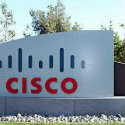Cisco's choosing to absorb higher prices for scarce silicon by narrowing its profit margins – but it can't do this forever, warns its CEO.

A continuing world shortage of silicon will hit Cisco's profit margins this quarter, the company says.
"The supply chain issues will stay with us through, from what I can see, at least through the end of this calendar year," says Scott Herren, the company's chief financial officer.
The company has had to pay "expedite fees" and prices to guarantee its semiconductor supplies, and has chosen to absorb higher costs into its profit margins instead of raising prices, says its CEO Chuck Robbins.
Robbins characterized this as a decision to "endure short-term pain" to maintain market share and preserve customer relationships.
If higher costs appear to be sticking, though, the company says it will "look at strategic price increases."
The big short supply
Cisco's sales remained strong, with Robbins noting "strong demand across the business," though analysts questioned whether the stockpiling phenomenon has flattered these too.
Product orders grew by 10% in the three months ending March 31, their highest rate since late 2011. Total revenue was up 7% on the year-ago quarter, to $12.8 billion, ahead of analysts' estimates of $12.56 billion.
Net income was up too, to $2.86 billion from $2.77 billion a year ago.
Revenue guidance for the current quarter would have been stronger without the supply-chain issues, says Robbins.
Despite the revenue numbers, Cisco's stock fell by 6.5% in overnight training, following the revelations about how it expects the silicon shortage to affect its bottom line in the underway quarter.
Cisco on a shopping spree
Cisco pioneered connecting geographically separated computers over a router system in the 1980s and has gone on to become a global leader making network equipment that helps form the backbone of the internet.
Recently, Robbins' company has been on a shopping spree.
To bolster its Webex videoconferencing platform, it picked up UK cloud software company IMImobile for $730 million, and Slovakian startup Slido, whose platform lets audiences give real-time feedback to companies.
Webex doubled its users from March to November 2020, up to a monthly 600 million, and continues to see "double-digit growth," Robbins says.
Want to know more about 5G? Check out our dedicated 5G content channel here on Light Reading.
Cisco also nabbed Dashbase in January, and Acacia, for $4.5 billion, in March.
Cisco aims to use Dashbase to polish its offerings in unique and uncommon data sources and Acacia to strengthen itself in routing and optical networking.
That sale took two years to clear regulators' desks in the US, Germany, Austria and China.
Software update
Robbins has been pushing the company to networking services and software, where its revenue is increasing, from a focus on hardware, where it still gets the majority of its sales.
In hardware, routers experienced "strong double-digit growth" this quarter, as did the Catalyst 9000 series switches, Robbins said.
But the eye-popping acquisitions are all aimed at strengthening Cisco's software hand.
The IMImobile grab will be coupled with Cisco's new Webex Contact Center, as part of the company's ploy to branch into an AI-fueled "contact center-as-a-service."
Security has done well for Cisco too, in an age of ambitious cybercriminals. Its revenues there rose 13% to $875 million.
For all this, its core business remains selling network switches and routers, and it has about a 20% share of the telecom equipment market.
Related posts:
— Padraig Belton, contributing editor, special to Light Reading
About the Author(s)
You May Also Like










